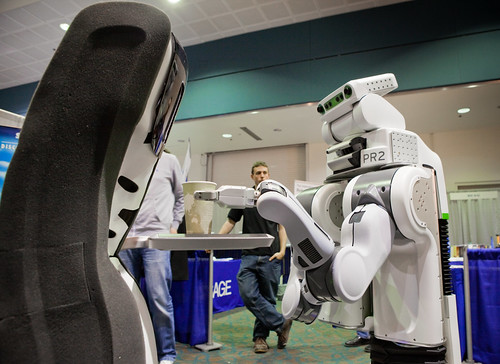
ROS will be on display at ICRA 2010. Here are some of the highlights:
Around the Floor
Willow Garage will be demoing various ROS libraries and tools in their booth.
Karto Robotics from SRI will be demoing in the Willow Garage and Gostai booths.
Scheduled Events
Radu Bogdan Rusu and Matei Ciocarlie will give a talk on, "Combining Perception and Manipulation in ROS" as part of the Workshop on Representations for Object Grasping and Manipulation. This will discuss the upcoming point cloud library, pcl, and manipulation stacks which are currently being developed for future versions of ROS.
When: Monday May 3, 12:00pm. Where: Dena'ina Center, Tubughnenq' 4.
Gary Bradski will give a talk on OpenCV and Radu Bogdan Rusu will give a talk on the Point Cloud Library in the Workshop on Best Practice in 3D Perception and Modeling for Mobile Manipulation.
When: Monday, May 3, 9:00 - 09:30 (OpenCV), 10:00 - 10:30 (PCL). Where: Dena'ina Center, Kahtnu 1.
Care-O-bot 3 and PR2 will participating in the Mobile Manipulation Challenge.
Where: Idlughet 3. When: Wednesday May 4th, 14:15 - 15:00 (PR2), Thursday May 5th, 15:00 - 15:45 (Care-O-bot 3).
ROS Tutorial will take place on Friday. This event is full.
Paper Presentations
Jürgen Sturm (University of Freiburg) will present "Vision-Based Detection for Learning Articulation Models of Cabinet Doors and Drawers in Household Environments",
which details some of the techniques used in the articulation_models package.
When: Tuesday, May 4, 2010, 08:30−08:45. Where: Egan Center Lower Level Room 9/10.
Eitan Marder-Eppstein (Willow Garage) will present "The Office Marathon: Robust Navigation in an Indoor Office Environment", which details the techniques used in the ROS navigation stack. The experimental code is provided here.
When: Tuesday, May 4, 9:15 to 9:30 am. Where: Egan Center Street Level, Room Cook Hall.
Wim Meeussen (Willow Garage) will present "Autonomous Door Opening and Plugging in with a Personal Robot", which is implemented in the pr2_doors stack. The experimental code is provided here.
When: Tuesday, May 4, 2010, 14:50−15:05. Where: Egan Center Lower Level Room 1.
Ellen Klingbeil (Stanford) will present "Autonomous Operation of Novel Elevators for Robot Navigation", which is implemented in the elevator packages in sail-ros-pkg.
When: Tuesday, May 4, 2010, 15:35−15:50. Where: Egan Center Lower Level Room 1.
Jeremy Maitin-Shephard (Berkeley) will present "Cloth Grasp Point Detection Based on Multiple-View Geometric Cues with Application to Robotic Towel Folding", which details the techniques used for the very popular towel-folding video demonstration.
When: Wednesday, May 5, 2010, 09:15−09:30, Where: Egan Center Lower Level Room 13/14.
Ioan Åžucan (Rice University) will present "Combining Planning Techniques for Manipulation Using Realtime Perception", which discusses a combined framework for motion planners (OMPL, CHOMP, SBPL) led to the development of the arm_navigation and motion_planners stacks. More information here.
When: Wednesday, May 5, 2010, 15:20−15:35. Where: Egan Center Lower Level Room 13/14.
Ben Cohen (Penn) will present "Search-Based Planning for Manipulation with Motion Primitives", which discusses some of the techniques used in the sbpl package. More information here.
When: Wednesday, May 5, 2010, 15:35−15:50. Where: Egan Center Lower Level Room 13/14.
Benjamin Pitzer (Bosch RTC) will present "Automatic Reconstruction of Textured 3D Models", which is demonstrated in this video and builds upon packages in bosch-ros-pkg.
When: Thursday, May 6, 2010, 09:45−10:00. Where: Egan Center Lower Level Room 3.
Anthony Mallet (LAAS/CNRS) will present "GenoM3: Building Middleware-Independent Robotic Components", which aims to bring greater interoperability among robotics platforms.
When: Thursday, May 6, 2010, 15:20−15:35. Where: Egan Center Lower Level Room 6.







 ROS 1.1.6 has been released. This will be one of the last releases in the 1.1.x series as we are quickly approaching feature freeze. You can read the
ROS 1.1.6 has been released. This will be one of the last releases in the 1.1.x series as we are quickly approaching feature freeze. You can read the 
 The 11 recipients for the PR2 Beta Program have been announced! You can read the
The 11 recipients for the PR2 Beta Program have been announced! You can read the 